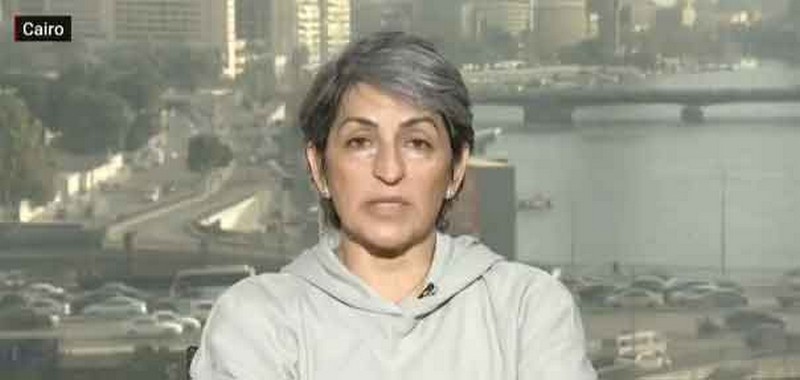By Dr Marwan Asmar
Top American-Palestinian novelist Susan Abulhawa talks about her harrowing recent two-week trip to Rafah and the southern part of Gaza. Besides her activism, Abulhawa has written three acclaimed novels, the first being Mornings in Jenin which was translated into 32 languages and sold over a million copies. She also writes poetry and is a director of the Playgrounds For Palestine. She recently talked about her visit to war-torn Gaza to Democracy Now. Excerpts of her slightly edited interview follow about the catastrophic situation she experienced and saw.
Intentional starvation
“…trying to venture into the north [of Gaza] is a suicide mission, [Israeli] tanks and snipers [are] positioned [there] and anyone trying to get there is basically killed…aid trucks are not getting in either, they are intentionally stopped, and it’s an intentional starvation… I was in south Gaza, in Rafah, I was able to go to Khan Younis, to Nuseirat [Camp] and few other places…but that became increasingly more dangerous.
I want to say the reality on the ground is infinitely worse than the worst videos and photos we are seeing in the West. There is as you know, a beyond, people buried alive en masse, in their homes, their bodies shredded to pieces…there is this massive daily degradation of life…a total denigration of a whole society that was once high-functioning and proud and has been reduced to the most primal of ambitions like being able to get enough water for the day or flour to bake bread.
And this is even in Rafah, and the people [here] will tell you they feel privileged because they are not starving to death like their families in the north, the ones they can reach because Israel [has] basically cut off 99 percent of communications – what remains there, are basic communications by people who set up some ingenious ways to keep the internet [going].
‘Total darkness’
But most people in the north have no idea of what is happening. As a matter of fact, at one point, [Gaza blogger] Bissan Odeh explained to me – as she often goes up to the border between Khan Younis and the middle area of the north where you can’t go beyond – an aid truck that sort of pushed its way through but was eventually fired upon had people coming up to it, thinking the war is over and people were returning to the north. So, most in the north are in total darkness and hunger and really have no way of communicating, no way of figuring out where to get food from.
What we are hearing on the ground is surreal, dystopic, what I witnessed personally in Rafah and some of the middle areas is incomprehensible, and I will call it a Holocaust, and I don’t use that word lightly but it is absolutely that.
I mean that’s how much people have been reduced to…the ceiling of their hope at this point, is for the bombs to stop. Everybody wants to go back. They talk about pitching a tent on their homes and figuring things out. But a lot of people are trying to leave. There is a brain drain, those who can afford it, those who can raise the money, or those who are able to get jobs elsewhere and who have professional skills, are trying to leave, they have children, all the schools have been destroyed, college students have nowhere to go.
Total denigration
What is happening to people isn’t just death, dismemberment and hunger, it is a total denigration of their personhood, of their whole society. There are no universities left, Israel intentionally bombed schools and blew them up, presumably to ensure that rebuilding them couldn’t take place, that reestablishing a society can’t take place without the infrastructure of education, of healthcare and basic foundational structures for buildings.
One of the things Israel has been keen to do in Gaza is to erase remanence of people’s lives. So, you have on an individual level homes complete with memories and photos and all the things of living. I am sure you know, Palestinians typically live in multi-generational homes, [now] these homes have several generations of the same family completely wiped out.
Israeli barbarity
On a societal level, Israel targeted places of worship like mosques, ancient churches, ancient mosques, they have targeted museums, cultural centers, libraries, any place that has records of peoples’ lives, has remanence and traces, their roots in the land, have been intentionally wiped away.
It’s really frustrating for us to read western media talk about Israel is targeting Hamas…This is not the case. When you are on the ground you, understand this has always been about displacing Palestinians, taking their place and wiping them off the map. That has been Israel’s stated goal, even in this instance and before in 1948. It has always been their aim to destroy us, remove us, kill us and take our place and that’s what’s happening now in Gaza. Its what happened in 1948, in 1967 and every new Nakba is greater than the one before, and here we now arrive at the moment of genocide and holocaust because the world has allowed Israel to act with such barbarity and impunity.”
Marwan Asmar is a writer based in Amman, Jordan and writes on Middle East Affairs
10 March 2024
Source: countercurrents.org

